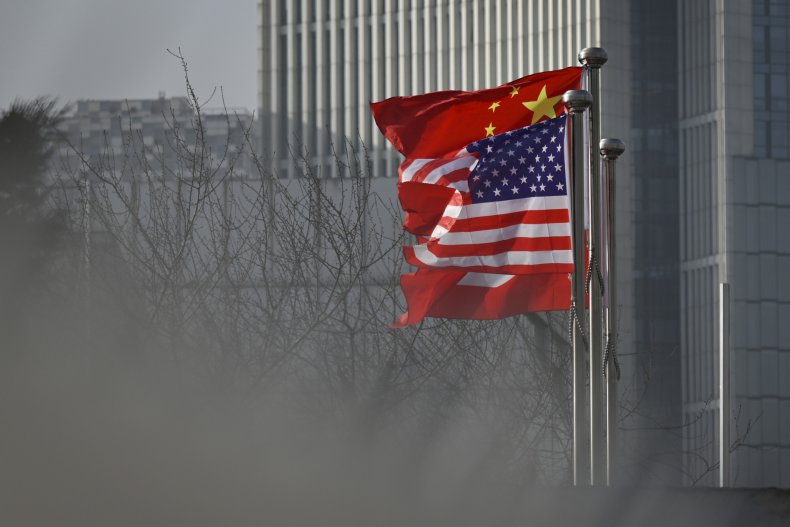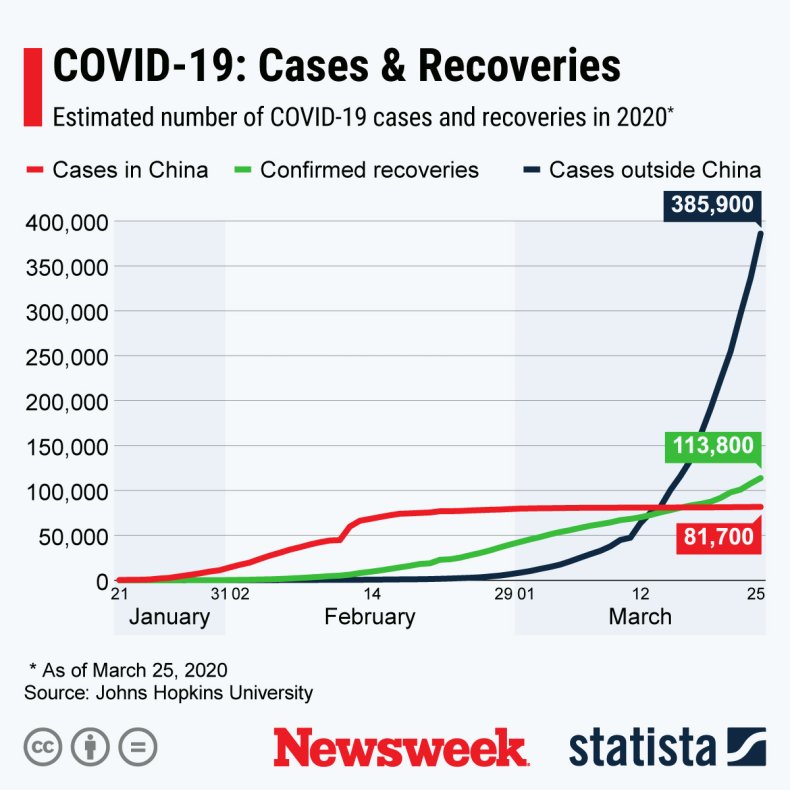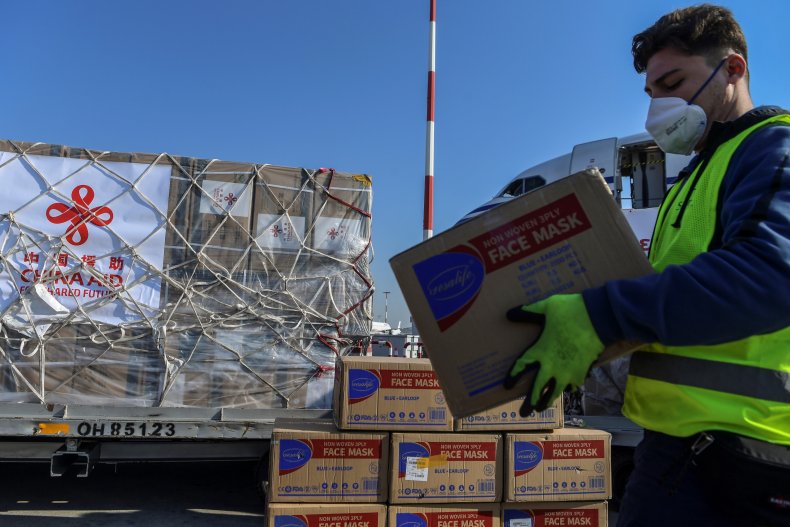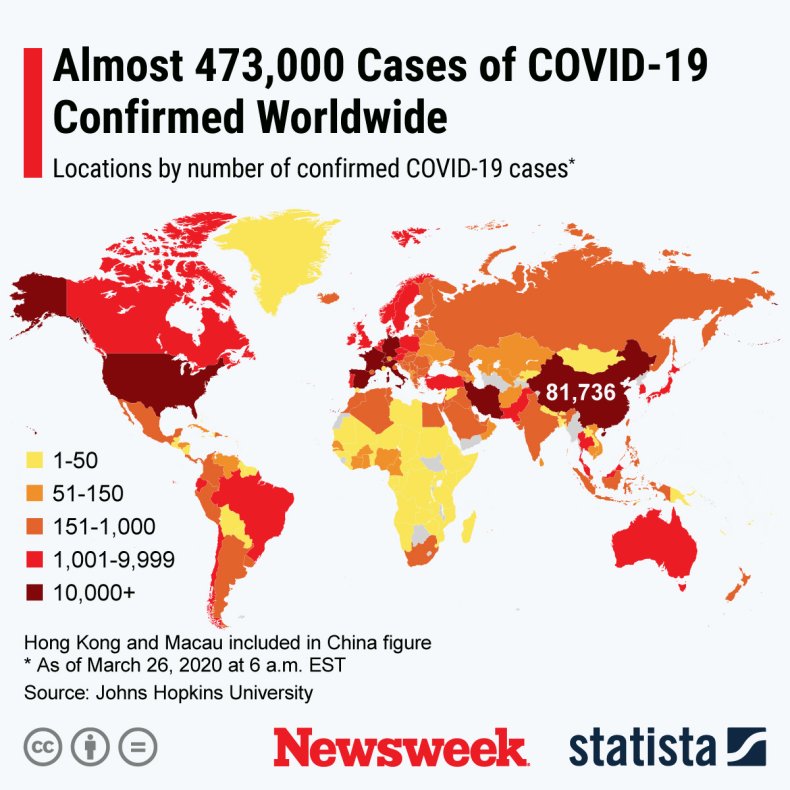As the United States and the People's Republic of China fight the new coronavirus outbreak—with the U.S. rapidly becoming the epicenter of the pandemic—experts said the economic superpowers' rivalry runs too deep for them to cooperate in the battle and that Bejing could emerge as a global leader during the international crisis.
COVID-19, the disease caused by the novel coronavirus, has emerged as the greatest international health crisis in at least a generation, infecting more than half a million people, 120,000 of whom have recovered and nearly 23,000 of whom have died. No threat since World War II has so substantially disrupted major economies, with lockdowns, quarantines and stay-at-home orders now becoming the norm in dozens of countries, including the U.S. and China.
The world's two leading powers could, in theory, collaborate to stop the spread of the new coronavirus. But rather than set aside differences to align as the U.S. and the Soviet Union did to tackle the mutual threat posed by the Axis Powers seven decades ago, Washington and Beijing instead find themselves more at odds than at any point in recent memory. George Crane, a political science professor at Williams College in Williamstown, Massachusettes, told Newsweek that "it is hard to see a moment in the past 40 years or so where relations have been worse" between the two nations that have since established themselves as the world's top two economic powers.
"There is obviously a deep mistrust that has been cultivated between the U.S. and the PRC, at least at the level of political leadership, in the past several years, and that mistrust undermines the kind of constructive cooperation that is so sorely needed at this moment of global crisis," Crane said.
He said he believed the U.S.-China feud, once marked by "episodic" instances of heightened tensions, has now become "structural, the effect of long-developing shifts in power and policy." Amid their strained relationship, he said, "the U.S. has not adjusted effectively to the fact of greater PRC power," while Beijing "seems rather more clear and consistent in its strategy: to continue to build itself into a formidable regional and, increasingly, global power."
"Sadly, each side now is turning to nationalism to deflect domestic attention away from the growing difficulties and blame the other," Crane added.

COVID-19 was first observed in Wuhan, the capital of China's central Hubei province and the initial epicenter of the outbreak. Chinese health officials notified WHO in late December that a new coronavirus disease had been recorded and President Donald Trump initially praised his Chinese counterpart Xi Jinping's response to the outbreak throughout January and even much of February.
Today, however, the epicenter of the illness is in the West, killing more people in Italy and Spain than China. The U.S. itself will soon be the worst-hit country in the world, experts predict. But by early March, senior conservatives and Trump's top diplomat, Secretary of State Mike Pompeo, had adopted the term "Wuhan virus" to refer to the new illness, which it blamed the ruling Chinese Communist Party for mishandling.
Beijing hit back. Chinese spokesperson Zhao Lijian shared a video on Twitter that showed Centers for Disease Control and Prevention Director Robert Redfield telling the House Oversight Committee that there was a possibility that U.S. nationals killed by influenza may actually have died from COVID-19 before testing of the new coronavirus disease was conducted. Neither the CDC nor the World Health Organization has reported COVID-19 infections in the U.S. before the Wuhan outbreak.
"CDC was caught on the spot," Zhao wrote. "When did patient zero begin in US? How many people are infected? What are the names of the hospitals? It might be US army who brought the epidemic to Wuhan. Be transparent! Make public your data! US owe us an explanation!"
Trump from then on almost exclusively referred to COVID-19 as "the Chinese virus," a term the president himself acknowledged he'd dropped as of Tuesday, days after Beijing's ambassador to Washington Cui Tiankai distanced himself from the unfounded theory of the virus originating outside of China. Pompeo continued to use the phrase "Wuhan virus" through Thursday.
"In both cases, the sophomoric name-calling is a political strategy—an element of the more general nationalist appeal mentioned above—aimed at preserving the political power of, respectively, the Trump regime and the Chinese Communist Party," Crane told Newsweek, noting Cui's recent remarks.
"Although that might just be a kind of 'good cop/bad cop' tactic on the part of the PRC leadership, it suggests that at least someone might realize that this kind of blame game offers nothing meaningful insofar as addressing the immediate pandemic is concerned," he added, "I hope the Trump people follow suit and drop the useless grandstanding."

Though China's economic growth stands to take a hit from projected COVID-19-related losses, Beijing retains a cordial relationship with Russia, which has reported only about 840 cases across the country. Russian President Vladimir Putin announced Wednesday a week-long paid vacation for his citizens and mobilized his military to fight COVID-19 both at home and abroad.
As potential rulers for life, Xi and Putin have fostered historically close ties—the so-called "dragonbear" relationship that seeks to defy a perceived U.S. hegemony that dominates the global economy and likely maintains more military bases than all other countries combined. Throughout the pandemic, Moscow and Beijing have kept close contacts and have responded to international pleas for assistance that has since reached the likes of Italy, host to the U.S.-led NATO Western military alliance's southern command.
Pavel Koshkin, senior research fellow at the Russian Academy of Sciences' Institute for U.S. and Canadian Studies and an expert at the Russian International Affairs Council, told Newsweek he was "initially skeptical about Russia's timely response to the novel coronavirus pandemic" because of a failure to block travel to China and an overall lack of transparency. Ultimately, however, the country "turns out to have been pretty well so far in its response to the virus outbreak in comparison with the U.S.—yet not necessarily compared to China," he added.
Koshkin said that the pandemic "has indeed united Russia and China and drawn them even closer," though they still retain differing goals.
"Ostensibly, they see it as a global challenge and ready to cooperate with the rest of the world. What is behind these intentions remains to be seen in the future," he added. "Yet I do believe that such cooperation is valuable for both sides from the point of view of experience and long-term ties, especially in a time of crisis. Definitely, it will only strengthen their cooperation. Russia values those who don't let partners down. At least, this is how the situation is presented for an audience. Again, what is behind, one can only guess."
Critics see the Beijing-Moscow strategic partnership—short of an alliance—as a marriage of convenience. The two nations once before presented a united front as a brief communist bloc before falling out as competitors during the Cold War in the 1960s. For the first time, however, Russia has emerged as a leader in advanced boost-glide hypersonic technology and China is already ranked as the world's premier economic power by purchasing power parity.

The Trump administration has accused its two adversaries of peddling misinformation about the novel coronavirus, which has significantly hit Iran, a nation under strict U.S. trade restrictions that Washington considers justified but Beijing and Moscow deem especially inhumane amid the current pandemic. "The media should know better than to believe and propagate Chinese and Russian propaganda that misleads the public into believing U.S. sanctions are to blame," the State Department said in a fact sheet circulated Tuesday.
The new coronavirus tests not only geopolitics, but ideology, a field in which the Trump administration finds itself competing for influence even among its own European allies.
"The COVID-19 is a global challenge, yet far from bringing nations together, it only sparks the confrontation even further between the authoritarian capitalism—represented by China and Russia—and the liberal democracy—represented by the U.S. and its EU allies," Koshkin told Newsweek. "Each system in this situation tries to showcase its own advantages, prowess and efficiency."
The EU now finds itself at a crossroads, seeking close transatlantic relations with Washington while courting lucrative contracts with Beijing. Rui Zhong, program assistant for the Wilson Center's Kissinger Institute on China and the United States, told Newsweek that "European states are familiar with the political implications of being co-opted into geopolitical questions concerning China, having just experienced questions of Huawei and 5G infrastructure, as well as Belt and Road Initiative loans and project funding."
The U.S. vocally criticizes such collaboration, warning countries doing business with China could find themselves eternally indebted to the People's Republic and potentially allow Beijing to tap into telecommunications networks. Washington considers the growing Chinese footprint in the West to be a serious threat and the fallout of the new coronavirus could further ignite their ongoing struggle for some time to come.
"COVID-19 has introduced a security problem that impacts both the United States and China," Zhong said. "Rhetorically, it has been easy for leadership in Beijing and Washington to point to the other as the central problem, even in issues with a heavily domestic element, as in the case of this virus. The stagnation of the global supply chain has prompted China hawks in the U.S. and America hawks in China to accelerate economic decoupling efforts."
"I expect that trajectory to stay on the agenda as both countries recover from the epidemic," she added. "The stakes of the current argument between China and the United States will remain more or less in place months, possibly years from the present."

The above graphics were provided by Statista.
Top stories - Google News
March 26, 2020 at 01:24PM
https://ift.tt/2QPXaij
Why U.S. and China Can't Team Up to Defeat the Coronavirus Outbreak - Newsweek
Top stories - Google News
https://ift.tt/2FLTecc
Shoes Man Tutorial
Pos News Update
Meme Update
Korean Entertainment News
Japan News Update
Bagikan Berita Ini
















0 Response to "Why U.S. and China Can't Team Up to Defeat the Coronavirus Outbreak - Newsweek"
Post a Comment